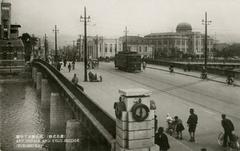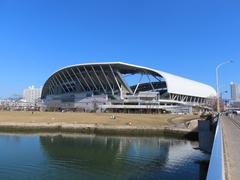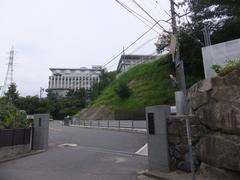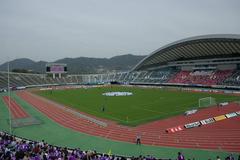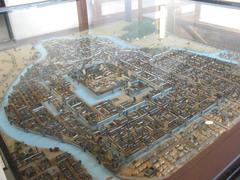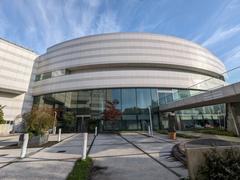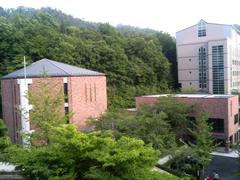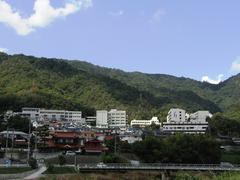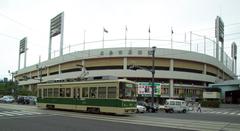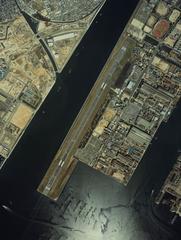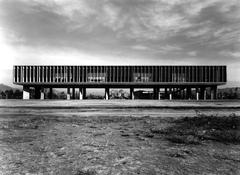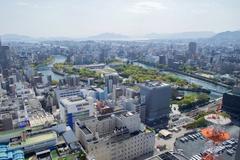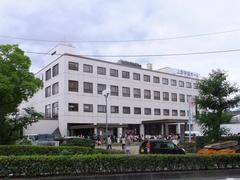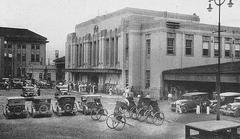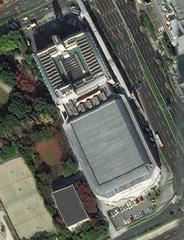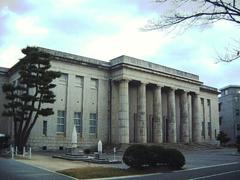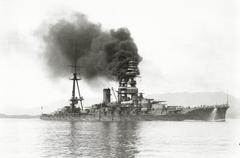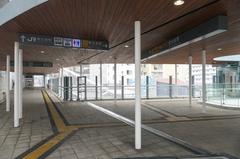
Hondōri Hiroshima: Visiting Hours, Tickets, and Historical Sites Guide
Date: 03/07/2025
Introduction
Hondōri Shopping Street is a central artery of Hiroshima’s urban life—a vibrant, covered pedestrian arcade that seamlessly blends the city’s historic resilience with its contemporary dynamism. Stretching 577 meters through Naka Ward, Hondōri is not only a bustling commercial hub but also a living symbol of Hiroshima’s spirit of peace and renewal. Located near major historical sites such as the Hiroshima Peace Memorial Park, Atomic Bomb Dome, and Hiroshima Castle, Hondōri is the perfect gateway for visitors who want to experience the intersection of history, culture, and modern Japanese city life.
This comprehensive guide provides essential information for planning your visit to Hondōri, including opening hours, ticketing details for nearby attractions, transportation, accessibility, event highlights, and travel tips. Whether you’re interested in historical exploration, local cuisine, shopping, or community events, Hondōri offers a unique and multifaceted experience in the heart of Hiroshima.
For up-to-date details and visitor resources, consult the official Hiroshima tourism website and the Hiroshima Peace Memorial Museum.
Contents
- Historical Overview
- Impact of the Atomic Bombing and Reconstruction
- Modern Hondōri: Shops, Dining, and Culture
- Visiting Hours and Ticket Details
- Accessibility and Transportation
- Nearby Attractions
- Events and Festivals
- Practical Travel Tips
- Frequently Asked Questions (FAQ)
- Conclusion and Recommendations
- Sources and Further Reading
Historical Overview
Hondōri, meaning “Main Street,” originated in the late 19th and early 20th centuries as Hiroshima modernized. Initially a commercial artery connecting the city’s railway station with its downtown core, Hondōri quickly emerged as a vibrant shopping and entertainment district. Its strategic location, near administrative and military centers, fostered rapid growth and urban prosperity by the pre-war era (Trundle Japan).
Impact of the Atomic Bombing and Reconstruction
On August 6, 1945, Hondōri was devastated by the atomic bombing—located less than 500 meters from the hypocenter, it was almost completely destroyed (Hiroshima Peace Memorial Museum). The area’s post-war resurrection began in the 1950s, when Hondōri was reconstructed as one of Japan’s first covered shopping arcades. This transformation turned the street into a powerful emblem of both hope and the city’s determination to rebuild as a “City of Peace.”
Today, the juxtaposition of Hondōri’s vibrant commerce and its proximity to Hiroshima’s peace landmarks serves as a daily reminder of the city’s journey from tragedy to resilience (Dive Hiroshima).
Modern Hondōri: Shops, Dining, and Culture
Shopping and Local Crafts
Hondōri is home to over 200 diverse businesses, ranging from international boutiques and department stores to local specialty shops. Whether you are looking for fashion, electronics, beauty products, traditional crafts, or unique souvenirs, the street offers options for every taste and budget (JapanTripIdeas).
Culinary Delights
The arcade is renowned for its culinary experiences. The iconic Okonomimura complex at the eastern end features 25 restaurants dedicated to Hiroshima-style okonomiyaki—a layered savory pancake that’s a symbol of local food culture (Kanpai Japan). Hondōri also offers a spectrum of Japanese and international restaurants, bakeries, izakayas, and quick-bite eateries, including vegetarian and dietary-friendly options.
Entertainment and Community
Hondōri’s welcoming, pedestrian-only design makes it a social hub for all ages. The arcade hosts gaming centers, karaoke, photo booths, and pop-culture shops. Regular seasonal events, street performances, and festivals further enliven the atmosphere, making Hondōri a stage for both traditional and modern Japanese expression (Hiroshima Localized).
Visiting Hours and Ticket Details
- Hondōri Arcade Access: Open to pedestrians 24/7.
- Shops and Restaurants: Generally operate between 10:00–20:00. Some open later, especially on weekends. Hours may vary by business (Japan Travel).
- Admission Fees: No tickets are required to access Hondōri. Some surrounding attractions, such as the Peace Memorial Museum or Orizuru Tower, have their own entrance fees (Hiroshima Peace Memorial Museum).
Accessibility and Transportation
Getting There
- Streetcar (Hiroden): Routes 1, 3, and 7 stop at Hondōri Station. Fares are typically 220 JPY within the city center (Japan Travel).
- Astram Line: The Astram Line terminates at Hondōri Station, connecting the downtown area with the city’s northwest suburbs.
- Bus: Frequent city buses and airport limousine buses stop at Hiroshima Bus Centre, a five-minute walk from Hondōri.
- On Foot: Hondōri is a short walk from Hiroshima Peace Memorial Park and other key sites.
Accessibility
- The arcade is wheelchair- and stroller-friendly, with smooth, wide, and level walkways.
- Public restrooms (including accessible facilities) are available in nearby department stores.
- Multilingual signage and information centers support international visitors.
Nearby Attractions
- Hiroshima Peace Memorial Park & Museum: A must-visit for historical and cultural context (Hiroshima Peace Memorial Museum).
- Atomic Bomb Dome: UNESCO World Heritage Site, a short walk from Hondōri (Travel + Leisure Asia).
- Hiroshima Castle: Offers historical exhibits and panoramic views.
- Okonomimura: Themed complex for Hiroshima-style okonomiyaki.
- Orizuru Tower: Observation deck with city views and interactive exhibits (Japan Insides).
Events and Festivals
- Hiroshima Flower Festival (May): Parades, performances, and food stalls fill Hondōri and the surrounding area (Nomadic Matt).
- Peace Memorial Ceremony (August 6): A citywide event with commemorations near Hondōri.
- Tōkasan Yukata Festival (June): Locals and visitors don traditional attire for street celebrations (Explore Hiroshima).
- Kagura Performances: Traditional Shinto music and dance, sometimes staged in or near Hondōri.
Practical Travel Tips
- Cash & Cards: Many shops accept credit cards, but some are cash-only. ATMs are widely available.
- Language: English signage is common; basic Japanese phrases enhance the experience.
- Best Times: Visit on weekdays or in the morning for fewer crowds.
- Weather: The covered arcade makes Hondōri pleasant year-round.
- Luggage: Coin lockers are available at Hiroshima Station and department stores.
- Wi-Fi: Free public Wi-Fi in many cafes and shops.
Frequently Asked Questions (FAQ)
Q: What are Hondōri’s opening hours?
A: The arcade is open 24/7 for pedestrians; most shops operate between 10:00–20:00.
Q: Are tickets required to enter Hondōri?
A: No, Hondōri is free to enter. Tickets are only needed for specific nearby attractions.
Q: How do I get to Hondōri from Hiroshima Station?
A: Take Hiroden Tram Line 1 toward Hiroshima Port, getting off at Hondōri or Kamiyacho-higashi Station.
Q: Is Hondōri wheelchair accessible?
A: Yes, the arcade is fully accessible, with level pathways and accessible restrooms.
Q: Is it safe to visit Hondōri at night?
A: Yes, Hiroshima is very safe, and Hondōri is well-lit and lively into the evening.
Conclusion and Recommendations
Hondōri Shopping Street stands as a dynamic crossroads of Hiroshima’s past and present. Its transformation from a pre-war commercial center, through post-war devastation and rebirth, to its current status as a vibrant social and economic hub, makes it a microcosm of the city’s enduring resilience. The street’s strategic location near Hiroshima’s most significant historical sites, coupled with its broad array of shopping, dining, and entertainment options, ensures a memorable visit for every traveler.
For the most current information on opening hours, special events, and guided tours, visit the official Hondōri website and consider downloading the Audiala app for interactive guides and personalized tips.
Experience the energy, history, and community spirit of Hiroshima at Hondōri Shopping Street—where tradition and modern life converge in the city’s beating heart.
Sources and Further Reading
- Hiroshima Official Tourism Website
- Trundle Japan’s Hondōri Guide
- JapanTripIdeas: Hondōri Street
- Dive Hiroshima: Hondōri Shopping Street
- Kanpai Japan: Hondōri & Okonomimura
- Hiroshima Localized: Hondōri Guide
- Japan Travel: Hondōri Shopping Arcade
- Hiroshima Peace Memorial Museum
- Nomadic Matt: Hiroshima Guide
- Japan Insides: Best Things to Do in Hiroshima
- Travel + Leisure Asia: Hiroshima
- Explore Hiroshima: Culture and Traditions
- Agate Travel: Hondōri Street
- Hondori Official Website




